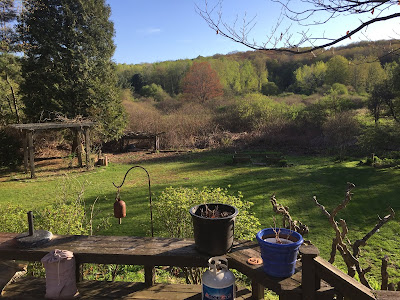Last night I read the most challenging argument James Carroll has yet penned concerning the Roman Catholic Church. His compelling jeremiad, "Abolish the Priesthood," has been published in the June 2019 edition of The Atlantic and warrants your prayerful attention. (see: https://www.theatlantic.com/magazine/archive/2019/06/to-save-the-church-dismantle-the-priesthood/588073/ )
Those who know Carroll's work will find resonance with his castigation of the clericalism that infects the Roman Catholic Church. He has made this case before: in his Boston Globe articles re: sexual abuse perpetrated by priests, in some of his works of fiction, and most thoroughly in both Constantine's Sword and Christ Actually. That he does so again highlights the depth of the Church's current brokenness - and moral bankruptcy. His disappointment with Pope Francis' attempts to administer justice and mercy in the wake of the massive sexual desecration of children and nuns by priests is palpable. His synthesis of his tradition's perversion is searing. And his agony over the status quo in Rome is compassionate and authentic. As he writes with grief, "what has been allowed to take place over decades... is murder of a soul." An early paragraph in Carroll's article sets the stage for what follows and is illustrative:
 Not long before The Boston Globe began publishing its series on predator priests, in 2002—the “Spotlight” series that became a movie of the same name—the government of Ireland established a commission, ultimately chaired by Judge Sean Ryan, to investigate accounts and rumors of child abuse in Ireland’s residential institutions for children, nearly all of which were run by the Catholic Church. The Ryan Commission published its 2,600-page report in 2009. Despite government inspections and supervision, Catholic clergy had, across decades, violently tormented thousands of children. The report found that children held in orphanages and reformatory schools were treated no better than slaves—in some cases, sex slaves. Rape and molestation of boys were “endemic.” Other reports were issued about other institutions, including parish churches and schools, and homes for unwed mothers—the notorious “Magdalene Laundries,” where girls and women were condemned to lives of coercive servitude. The ignominy of these institutions was laid out in plays and documentary films, and in Philomena, the movie starring Judi Dench, which was based on a true story. The homes-for-women scandal climaxed in 2017, when a government report revealed that from 1925 to 1961, at the Bon Secours Mother and Baby Home, in Tuam, County Galway, babies who died—nearly 800 of them—were routinely disposed of in mass graves or sewage pits. Not only priests had behaved despicably. So had nuns.
Not long before The Boston Globe began publishing its series on predator priests, in 2002—the “Spotlight” series that became a movie of the same name—the government of Ireland established a commission, ultimately chaired by Judge Sean Ryan, to investigate accounts and rumors of child abuse in Ireland’s residential institutions for children, nearly all of which were run by the Catholic Church. The Ryan Commission published its 2,600-page report in 2009. Despite government inspections and supervision, Catholic clergy had, across decades, violently tormented thousands of children. The report found that children held in orphanages and reformatory schools were treated no better than slaves—in some cases, sex slaves. Rape and molestation of boys were “endemic.” Other reports were issued about other institutions, including parish churches and schools, and homes for unwed mothers—the notorious “Magdalene Laundries,” where girls and women were condemned to lives of coercive servitude. The ignominy of these institutions was laid out in plays and documentary films, and in Philomena, the movie starring Judi Dench, which was based on a true story. The homes-for-women scandal climaxed in 2017, when a government report revealed that from 1925 to 1961, at the Bon Secours Mother and Baby Home, in Tuam, County Galway, babies who died—nearly 800 of them—were routinely disposed of in mass graves or sewage pits. Not only priests had behaved despicably. So had nuns.Carroll then summarizes the hope and failure of Vatican II. The institution did articulate and implement an authentic conversion from antisemitism to fraternal solidarity with Judaism. The quest to ground the liturgy in the language of real believers rather than arcane Latin was an important change, too. Even the church's attempt to empower faith communities to become "the whole people of God" rather than sheep under the authority of the priesthood is celebrated - even as its demise is lamented. Carroll cuts to the chase with the claim that "clericalism, with its cult of secrecy, its theological misogyny and its hierarchal power, is the root of Roman Catholic dysfunction" and renders the remainder of "Abolish the Priesthood" to this analysis. It is brutal and soul numbing, but vital for the Body of Christ and the world, too.
Carroll lifts up the ethics of Jesus as salvific. He honors the universal works of mercy the church has embodied for millennial as holy. And recognizes that life without the church would be a catastrophe:
 He continues by offering what strikes me as a sacred corrective: the reclamation of the laity as the whole people of God.
He continues by offering what strikes me as a sacred corrective: the reclamation of the laity as the whole people of God.
I love the Roman Catholic Church. Over my 40 years of serving as a pastor, all of my spiritual directors have been Roman Catholic. I have been strengthened and edified by Roman Catholic authors like Henri Nouwen, Joan Chittister, Jean Vanier, Thomas Keating, and Richard Rohr. And I have found a way back into resting/trusting in God's grace through the mystical love of Jesus experienced in meditation and Eucharist. I know that clericalism is just as toxic in my Reformed realm as it is in the Roman world. That is why I believe Carroll is on the right track.
Richard Rohr and Cynthia Bourgeault - like Phylis Tickle, Brian McLaren, Diana Butler Bass and others - have been making the case that the old way of being faithful is dying. My experience suggests that they are right. The mass exodus from all types of organized religion in the West has been documented ad nauseum for decades. A few courageous souls have even suggested clues as to what new forms of shared worship and faith formation might look like in a new incarnation. My gut tells me that these projections are premature and likely to be transitional. For what is still emerging - and what aches to be born - is a way of being the whole people of God beyond institutions. Not ecclesiastical anarchism, but rather small communities with vibrant lay leadership. This is where I keep discovering new life, new faith and new hope: in a spirituality that proclaims that small is holy. In L'Arche. In intentional poetry readings. In small, new music venues. In on-line prayer and study. In Taize. In the movement of new monks.
Like Carroll, our new forms, "will always involve deliberate performance of the works of mercy: feeding the hungry, caring for the poor, visiting the sick, striving for justice. These can be today’s chosen forms of the faith." I sense that Rohr is on to something when he puts it like this:
If something comes toward you with grace and can pass through you and toward others with grace, you can trust it as the voice of God. One holy man who recently came to visit me put it this way: “We must listen to what is supporting us. We must listen to what is encouraging us. We must listen to what is urging us. We must listen to what is alive in us.” I personally was so trained not to trust those voices that I often did not hear the voice of God speaking to me, or what Abraham Lincoln called the “better angels of our nature...” We must learn how to recognize the positive flow and to distinguish it from the negative resistance within ourselves. It takes years of practice. If a voice comes from accusation and leads to accusation, it is quite simply the voice of the “Accuser,” which is the literal meaning of the biblical word “Satan.” Shaming, accusing, or blaming is simply not how God talks. God is supremely nonviolent. God only cajoles, softens, and invites us into an always bigger field and it is always a unified field.
Like Carroll, our new forms, "will always involve deliberate performance of the works of mercy: feeding the hungry, caring for the poor, visiting the sick, striving for justice. These can be today’s chosen forms of the faith." I sense that Rohr is on to something when he puts it like this:
If something comes toward you with grace and can pass through you and toward others with grace, you can trust it as the voice of God. One holy man who recently came to visit me put it this way: “We must listen to what is supporting us. We must listen to what is encouraging us. We must listen to what is urging us. We must listen to what is alive in us.” I personally was so trained not to trust those voices that I often did not hear the voice of God speaking to me, or what Abraham Lincoln called the “better angels of our nature...” We must learn how to recognize the positive flow and to distinguish it from the negative resistance within ourselves. It takes years of practice. If a voice comes from accusation and leads to accusation, it is quite simply the voice of the “Accuser,” which is the literal meaning of the biblical word “Satan.” Shaming, accusing, or blaming is simply not how God talks. God is supremely nonviolent. God only cajoles, softens, and invites us into an always bigger field and it is always a unified field.
Lord, may it be so.
NOTE: some may want to consider a recently publish rebuttal to Carroll printed in the Jesuit journal America @ https://www.americamagazine.org/faith/2019/05/30/church-without-priests-i-cannot-find-redemption-response-james-carrollutm_source= Newsletters&utm_campaign=22bbade73b-DAILY_CAMPAIGN_2019_5_30&utmmedium=
email&utm_term=0_0fe8ed70be-22bbade73b-58843693
email&utm_term=0_0fe8ed70be-22bbade73b-58843693
credits:
1. Pope Francis
2. Maternidad-guayasamin
3. Catholic Worker: mercy/war
4. Communities of Christ
5. World regligons
6. National Catholic Reporter


































